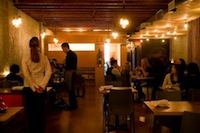Restau-Rants is Eater's safe space that allows the owners, operators, chefs and bartenders in the restaurant industry let rip about a topic that drives them nuts. Today, one of the city's most respected chefs, Robert Belcham, owner of Campagnolo and Campagnolo ROMA vents.
Long ago, I was a green cook working at the Aerie Resort, just trying to make great food. It was at this restaurant I began to understand the direct relationship between the cook and the ingredient; I started to see how decisions as cooks regarding the products we used, impacted more than just what ends up on the plate. Now I realise that these decisions affect the diner, the producer, the animal and the cook.
Sustainability is a buzzword people have been throwing around for a while; "Is this harvested or managed sustainably?" is a question often asked of young cooks. Cooks with little to no training, experience, or education are expected to educate diners, but what does it mean? What are the diners really asking? Sustainability isn't just about the environment, it is about sustainability within the environment.
I am concerned for the sustainability of people: people in our chosen profession of 'chef'. What a chef once was is not what a chef is today. The onset of cheaper labour and the rise in use of more highly-processed foods in a restaurant environment has meant that chefs are becoming an endangered species. Highly trained in all aspects of cooking, baking, pastry and butchery, the role of chef as it once was, is disappearing. I am one of those highly-trained chefs, and I believe it is my duty to train those who work for me to become as highly trained as I am.
 The art of butchery is fundamentally needed to know how to properly cook a cut of meat. To be a chef, you need to know how to butcher. I bring in two whole pigs from Sloping Hill Farm every week to Campagnolo. They arrive on Wednesday and we butcher on Thursday. My cooks take the pigs apart. They gain an intimate knowledge of the anatomy of the animal, they respect it and understand it. How much do you understand about a cut of meat that is delivered to you in a plastic bag? Nose-to-tail is not just about cooking or eating the odd bits from many animals, it's about utilizing everything; from the nose to the tail from one animal.
The art of butchery is fundamentally needed to know how to properly cook a cut of meat. To be a chef, you need to know how to butcher. I bring in two whole pigs from Sloping Hill Farm every week to Campagnolo. They arrive on Wednesday and we butcher on Thursday. My cooks take the pigs apart. They gain an intimate knowledge of the anatomy of the animal, they respect it and understand it. How much do you understand about a cut of meat that is delivered to you in a plastic bag? Nose-to-tail is not just about cooking or eating the odd bits from many animals, it's about utilizing everything; from the nose to the tail from one animal.
Our pigs come from a farm that practices ethical and humane animal husbandry. The pigs travel a short distance leaving a small environmental footprint. We use all the parts; nothing goes to waste, choice cuts rotate and are used in main dishes, we make our own pancetta and cure whole ham legs, bones are used for stocks, we celebrate offal with Quinto Quarto dinners and on the menu, we even serve whole pigs heads from time to time... you get the picture.
Butchery is a dying art, it is being replaced by an almost robotic group of poorly skilled and cheap labourers who make the same series of cuts over and over on an assembly line that even Henry Ford would envy. These pieces of meat get cut all the way down to individual portions that are vacuum packed and sent to restaurants to use. Ever see pork chops on a menu? How many pork chops come from one pig? About 16. How many pigs does it take to fill an order to a restaurant that only uses one cut of meat?
Is whole animal butchery sustainable from a business perspective? When you are in the business of serving the best ingredients possible, creating chefs not cooks, and give a shit about the environment, the answer is yes. Restaurants have to take responsibility for where their products come from and how their staff are trained, if they don't who the fuck will?
. All Restau-Rants [EVAN]
· Campagnolo Roma [Official Site]
· Campagnolo [Official Site]